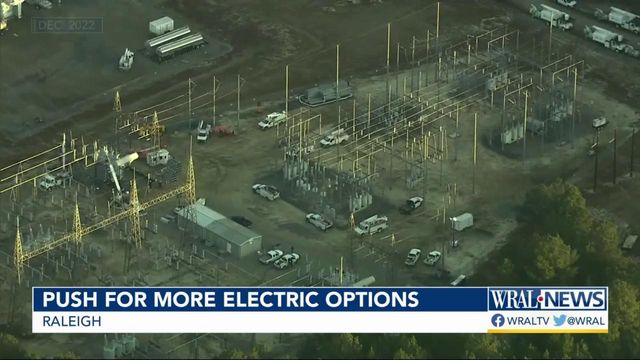Big electricity users push for competition in NC energy market
Large electricity customers want North Carolina to consider an overhaul of its energy market, moving from a regulated monopoly to a wholesale market that lets them pick from multiple suppliers, seeking bulk discounts and, in some cases, cleaner energy generation.
This push toward a wholesale energy market has been pitched for years and doesn’t seem to have the support it needs in the North Carolina General Assembly. But backers sense at least some momentum as neighboring South Carolina studies the issue and a recent report predicts hundreds of millions of dollars in potential annual savings for customers.
A series of rolling outages across the region on Christmas Eve feature prominently in the latest pitch to move away from North Carolina’s monopoly system, where Duke Energy is the only option for most customers and has its rates set by an appointed state utility commission. Nine companies and five industry groups sent lawmakers a letter last week, calling on them to at least study a wholesale market that would enable other power generators to deliver electricity through Duke Energy’s grid, setting up a bidding system.
“We are proud to have operations in the state; however, we are concerned over limited access to cost-competitive, clean energy necessary to meet our energy needs in North Carolina,” the companies, including Nestlé, Unilever and Marriott, said in their letter. “State regulated monopoly utilities are not offering optimally designed and scalable clean energy programs. Recent rolling blackouts during Winter Storm Elliott highlight the urgent need for sufficient reliable and affordable electricity in North Carolina that will benefit all customers.”
Duke Energy earns a profit margin set by state regulators when it builds new power plants. The company is against the shift. A Duke Energy spokesman said in a statement Thursday that the company “remains committed to providing affordable, reliable, and cleaner energy to all of our customers and will continue to look towards the future.”
The group behind the letter wants lawmakers to pass House Bill 503, which would fund a $500,000 study of the issue. That measure, introduced in late March, hasn’t gotten a committee hearing at the General Assembly, signaling a lack of support from leaders in the legislature.
The General Assembly is off this week, and bill sponsors didn’t immediately respond when WRAL News asked Thursday whether their proposal, which has bipartisan support, stands any chance as lawmakers look to wrap their legislative session later this month.
The companies’ letter was sent to all 170 members of the General Assembly and Gov. Roy Cooper. Asked about the letter, Cooper spokesman Jordan Monagan said "North Carolinians want clean energy that's reliable and at the lowest cost, and it's important for the state to consider the options to ensure that happens."
State lawmakers rejected similar calls for market reform two years ago when they passed bipartisan legislation mapping Duke Energy’s phase-out of coal-fired electricity generation and preserving the state’s regulated monopoly system. Those changes, and other factors, are expected to contribute to significant rate hikes over the next few years as coal plants are replaced and the grid is modernized.
Wholesale energy markets are common in the United States. In its letter, the coalition said systems like these, often called regional transmission organizations, serve more than 70% of U.S. energy customers. They’re not typically used in the southeast, but businesses pushing for change in North Carolina have some optimism.
South Carolina’s state legislature commissioned a study several years ago. And in May, a consulting group predicted savings as high as $362 million a year there. Kevin Martin, executive director of the Carolina Utility Customers Association, said some of his member-companies think they can save millions of dollars a year on electricity if they’re able to shop around.
Many of the group’s members are manufacturers, and electricity is one of their largest costs.
“That’s huge,” Martin said.











